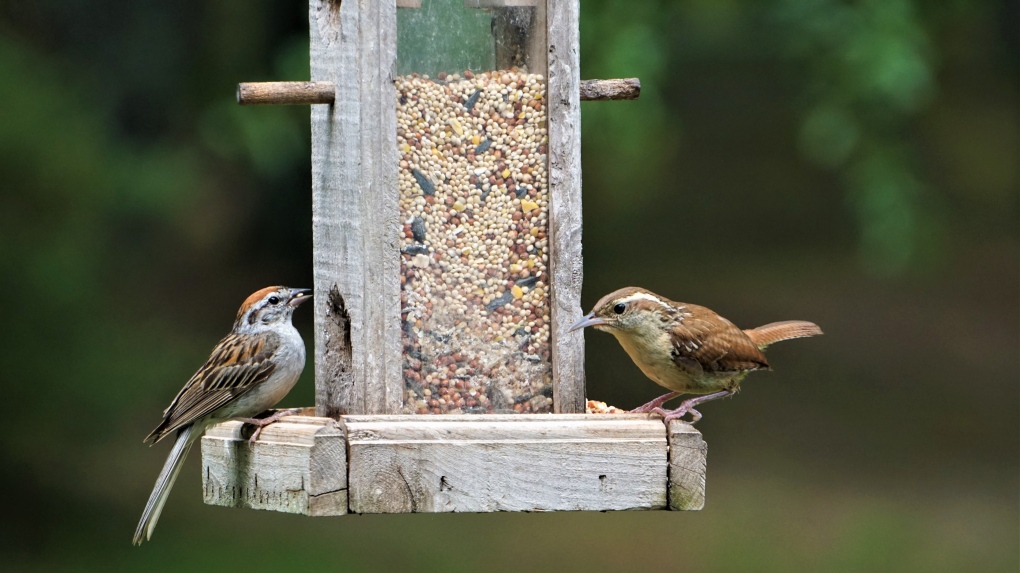B.C. residents asked to remove bird feeders, baths amid avian flu outbreak
 A bird feeder is seen in this undated image. (Shutterstock)
A bird feeder is seen in this undated image. (Shutterstock)
An outbreak of avian flu across Canada with several cases confirmed in B.C. prompted an animal welfare agency to ask residents to temporarily remove bird feeders and baths.
The B.C. SPCA issued a notice Thursday warning of the rapid spread of the flu, which can cause serious disease or death in birds. The agency said wild birds "play a key role" in spreading the flu, with raptors like eagles, hawks and owls at greatest risk.
To reduce the spread of disease, the SPCA said, backyard bird feeders should be put away and bird baths should be emptied.
"Bird feeders facilitate the spread of the disease by encouraging unnatural congregations of birds and attracting other wildlife including predators and rodents," the warning from the SPCA said.
"The presence of bird feeders and baths can also increase the risk of transmitting the virus between nearby animals like backyard chickens or turkeys."
Several avian flu cases have been recorded in B.C. this year. On Wednesday, the province announced the highly pathogenic strain was detected in two more flocks of domestic birds, this time in Richmond and Kelowna.
In total, four small flocks of domestic birds and one commercial poultry operation have reported positive tests in the province. The flu has also appeared in multiple wild birds, according to a Metro Vancouver rehabilitation facility.
"Unfortunately, the death rate is quite high, and it's been within 24 hours," Rob Hope with the Orphaned Wildlife Rehabilitation Society in Delta told CTV News Vancouver.
In very rare cases, the virus can spread to people who had close contact with infected birds or were in heavily contaminated areas.
The SPCA said the public can also help by watching out for any sick birds.
"Sick birds may appear lethargic, unusually 'fluffed up,' have nasal discharge, or have excessively watery eyes or swelling of the head and eyelids," the SPCA said.
Anyone who sees a sick bird can contact the SPCA at 1-855-622-7722 for advice.
While the request to remove bird feeders is temporary, the SPCA said it recommends only putting them out between October and March, because there are many natural feeding opportunities for birds in the spring and summer.
Hummingbird feeders have the lowest risk because they're species-specific, but owners should regularly change the nectar and clean the feeders to prevent deadly fungal outbreaks.
With files from CTV News Vancouver's Maria Weisgarber
CTVNews.ca Top Stories

Bird flu, measles top 2025 concerns for Canada's chief public health officer
As we enter 2025, Dr. Theresa Tam has her eye on H5N1 bird flu, an emerging virus that had its first human case in Canada this year.
Christmas shooting at Phoenix airport leaves 3 people wounded
Police are investigating a Christmas shooting at Sky Harbor Airport in Phoenix that left three people injured by gunfire.
Azerbaijan observes day of mourning for air crash victims as speculation mount about its cause
Azerbaijan on Thursday observed a nationwide day of mourning for the victims of the plane crash that killed 38 people and left all 29 survivors injured as speculation mounted about a possible cause of the disaster, with some experts saying that the airliner was damaged by Russian air defence fire.
6,000 inmates stage Christmas Day escape from high-security Mozambique prison
At least 6,000 inmates escaped from a high-security prison in Mozambique's capital on Christmas Day after a rebellion, the country's police chief said, as widespread post-election riots and violence continue to engulf the country.
Plush toys recalled due to choking hazard
Health Canada is recalling a series of plush toys due to a choking hazard. Anyone who has purchased an elephant, giraffe, lion, tiger and/or panda plush toy with an attached baby can return them to the place of purchase for a refund.
Donald Trump says he urged Wayne Gretzky to run for prime minister in Christmas visit
U.S. president-elect Donald Trump says he told Canadian hockey legend Wayne Gretzky he should run for prime minister during a Christmas visit but adds that the athlete declined interest in politics.
New York taxi driver hits 6 pedestrians, 3 taken to hospital, police say
A taxicab hit six pedestrians in midtown Manhattan on Wednesday, police said, with three people — including a 9-year-old boy — transported to hospitals for their injuries.
Working Well: Returning to the office can disrupt life. Here are some tips to navigate the changes
Heading into 2025, thousands of workers face an unsettling reality: after years of working from the comfort of home, they must return to the office full-time for the first time since the coronavirus pandemic or look for new work.
Prayers and tears mark 20 years since the Indian Ocean tsunami that killed some 230,000 people
People gathered in prayer and visited mass graves in Indonesia’s Aceh province on Thursday to mark 20 years since the massive Indian Ocean tsunami hit the region in one of modern history’s worst natural disasters.































